Arizona Culinary Institute’s program was designed to make sensible and efficient use of your time and resources. Students are able to complete our program and earn their diplomas in as little as 8 months. Our program begins with 6 weeks dedicated to learning the “Basics,” which allows you to begin or enhance your career. You will never grasp these basic skills fully in an academic classroom, so be prepared to start cooking right away!
Day Program 30 weeks in Length
Night Program 40 wees in Length

Prerequisites: None.
Students are given a thorough introduction into the basic skills, techniques, concepts and theory involved in professional cooking. Emphasis is given to Classical French cooking theory including the principles of Escoffier. Garde manger, mother sauces, small sauces and a variety of traditional and modern preparation techniques are covered. Students are taught proper knife skills and handling, as well as safety and sanitation. Class is theoretical and practical.
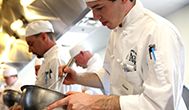
Prerequisites: Basic Culinary Arts I
The knowledge gained in Basic Culinary Arts I is further enhanced to complete a solid foundation upon which to build. Techniques and speed are improved and refined with practice. Students learn and prepare soups, fish and shellfish and a variety of meats (chicken, beef, lamb, pork). Essential knowledge of mise en place and food presentation skills are reinforced. Class is theoretical and practical.
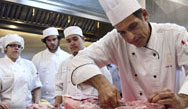
Prerequisites: Basic Culinary Arts I & II.
This course covers soups, stock making, and a variety of modern and traditional sauces. Knife and Garde Manger skills are further enhanced. Students continue to work with a variety of meat, seafood and poultry and are taught to fabricate menu items. Charcuterie is also taught in this course. Students will also learn to prepare food in larger quantities. Class is theoretical and practical.
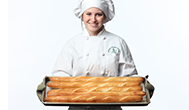
Prerequisites: Basic Culinary Arts I & II; Saucier & Meat Fabrication.
Students are presented with the fundamental skills used in bakeries and preparing bakery products. Baking theory is taught and applied including weights and measures, safety and sanitation. Students will prepare quickbreads, yeastbreads, croissants, cakes, pies, pastry, pastry creams, brioche, frostings and icings. Class is theoretical and practical.

Prerequisites: Basic Culinary Arts I & II; Baking and Pastry; Meat Fabrication and Saucier
The focus of this course is kitchen management from a staffing, employee training, and flow of food perspective. Emphasis is placed on food and beverage menu development, basic kitchen math, and sanitation including training for the ServSafe Manager Certificate and ServSafe Allergen Certificate. The history, production, tasting and pairings of non-alcoholic beverages, beer, spirits and wine are taught in depth. The career development element of the course will lay out a plan for success in the food and beverage industry by developing the professional skills for goal setting, resume writing, and interviewing. This class is lecture and presentation based with practical study through tasting and assignments.
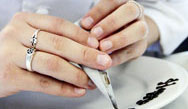
Prerequisites: Basic Culinary Arts I ⅈ Saucier and Meat Fabrication; Baking and Pastry; Food & Beverage Management and Career Development
Baking skills are polished as students learn more difficult baking, pastry and dessert techniques. Emphasis is placed on presentation, plating and appearance. Class includes advanced pastries, chocolates, sugar casting, sugar pulling, marzipan and Isomalt, and complex cake decorating techniques. Class is theoretical and practical.

Prerequisites: Basic Culinary Arts I & II; Saucier and Meat Fabrication; Baking and Pastry; Food & Beverage Management and Career Development; Advanced Baking, Pastry & Showpieces
Students will operate du Jour Restaurant, ACI’s fine dining facility. du Jour is open to the public and students gain a practical understanding of operations by running the restaurant and staffing all positions including, maitre d’, waiting and bartending. Although culinary terminology is taught throughout the program, students in this class are taught the vocabulary of Culinary French. Class is theory and practical.
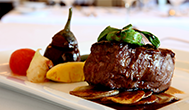
Prerequisites: Basic Culinary Arts I ⅈ Saucier and Meat Fabrication; Baking and Pastry; Food & Beverage Management and Career Development; Advanced Baking, Pastry, and Showpieces; Restaurant Management Culinary Nutrition
Complete meals are prepared by students in a fully equipped front line kitchen. Daily menus served to the public include a variety of European, American and International Cuisines. Students gain real world experience by moving among various kitchen stations. Class is theoretical and practical.

Prerequisites: Basic Culinary Arts I ⅈ Saucier and Meat Fabrication; Baking and Pastry; Food & Beverage Management and Career Development; Advanced Baking, Pastry, and Showpieces; Restaurant Management; Advanced Cuisine-du Jour Restaurant
In the final course of ACI’s program, students are required to complete a 210-hour (6-week) internship as paid or unpaid by the internship employer. The internship site must be approved by Arizona Culinary Institute. The student must acquire an internship they were trained for, i.e. cook, pastry cook, sous chef, chef, server, food service manager, etc. The student’s internship progress is strictly monitored by ACI’s Placement Director and school Registrar. Students must complete the proper documentation as a record of their internship hours. Timesheets must be signed by the student and their supervisor at the approved internship site and be submitted to ACI on a weekly basis. Internship hours that have been accumulated will not count towards the completion of the 210 hours if the student is dropped from the program during their internship.